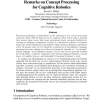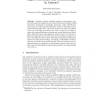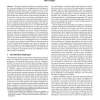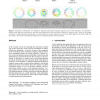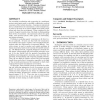2
posts
with
317
views
317
views
LDVF
2000
14 years 2 months ago
2000
We present preliminary considerations on the architecture of a CONCEPT processing system for robots. With the help of CONCEPTS cognitive robots will be able to structure their sen...
COGSCI
2004
14 years 2 months ago
2004
I show how a conversational process that takes simple, intuitively meaningful steps may be understood as a sophisticated computation that derives the richly detailed, complex repr...
ALIFE
2005
14 years 2 months ago
2005
We present a new definition of the concept of representation for cognitive science that is based on a study of the origin of structures that are used to store memory in evolving sy...
JETAI
2008
14 years 2 months ago
2008
gle level of abstraction cannot capture the required richness of behavior. In this paper, we offer a brief principled defense of epistemological pluralism in cognitive science and ...
FLAIRS
1998
14 years 3 months ago
1998
For many reasons, it is desirable to use robots in courses such as introductory computer science, artificial intelligence, and cognitive science, yet the knowledge normally require...
WSPI
2004
14 years 3 months ago
2004
Cognitive sciences, including cognitive neurosciences, have provided important insights into the notions of awareness, implicit/explicit information processing in knowledge, percep...
AISB
2008
Springer
14 years 4 months ago
2008
Springer
Philosophy, artificial intelligence and cognitive science have long been dominated by the presupposition that intelligence is fundamentally individual. Recent work in cognitive sci...
SIGGRAPH
2010
ACM
14 years 4 months ago
2010
ACM
In the everyday exercise of controlling their locomotion, humans rely on their optic flow of the perceived environment to achieve collision-free navigation. In crowds, in spite o...
ATAL
2006
Springer
14 years 6 months ago
2006
Springer
For successful coordination and cooperation in a multiagent system, participants need to establish a sufficiently accurate awareness of the current situation. Awareness is underst...


